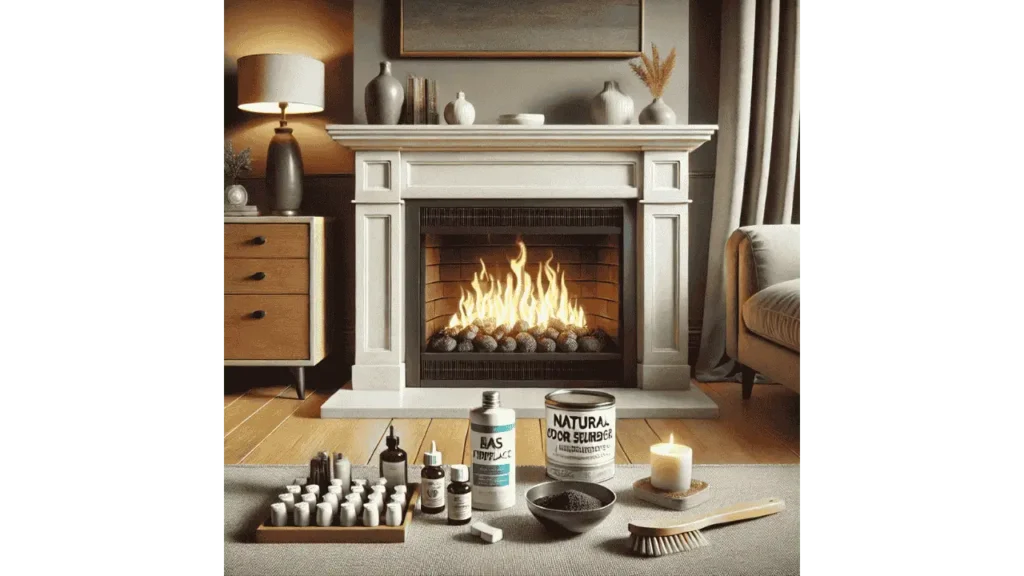Ever light up your gas fireplace and notice an unpleasant smell creeping in? It’s frustrating when something meant to be cozy ends up making your space feel off. I’ve been there too, but the good news is these odors are usually easy to fix. Whether it’s creosote buildup, moisture, or even debris in the chimney, there are practical steps you can take. In this guide, we’ll cover the common causes of fireplace smells and share six simple ways to get rid of them, so you can get back to enjoying a fresh, warm home. Let’s take a look!

How to Get Rid of a Fireplace Smell? What You Need to Know?
If you’ve noticed an unpleasant odor coming from your gas fireplace, it can really spoil the cozy atmosphere. I’ve dealt with this myself, and the good news is there are ways to fix it. Fireplace smells often result from buildup or poor ventilation, but tackling the issue head-on can help eliminate the odor. Whether it’s a musty smell or something stronger, identifying the cause is key. In this guide, we’ll walk through the common reasons for bad smells and share practical solutions to get your fireplace smelling fresh again. Keep in mind that if you already have a new gas fireplace, it’s pretty common to smell gas from it in the start!
Reasons Behind Bad Odor of Fireplaces
If your gas fireplace smells off, there are a few common culprits. Identifying the root cause will help you tackle the issue and get things back to normal. Here’s what could be causing that bad smell:
Creosote Buildup
Even with gas fireplaces, creosote can accumulate in the chimney. This substance creates a strong, smoky odor that worsens over time. If not cleaned regularly, it can also become a fire hazard, so staying on top of chimney maintenance is important.
Air Pressure Issues
Sometimes, negative air pressure in your home can cause air to flow down the chimney instead of up, bringing in musty or smoky smells. This can be especially noticeable during humid or stormy weather, when air pressure fluctuates more.
Pests
Unfortunately, critters like birds or rodents can sometimes make their way into your chimney. When they nest or worse, get stuck, this can lead to unpleasant, lingering odors. A quick inspection can usually reveal if pests are the problem.
Excess Moisture
Moisture in your chimney or around your fireplace can lead to mold or mildew, creating a damp, musty smell. This is often due to leaks or poor ventilation, and the smell can get worse if left unchecked.
Tree Debris
Leaves, branches, and other debris from nearby trees can fall into your chimney, causing blockages and musty odors. Regular cleaning helps prevent buildup and keeps your fireplace functioning properly.
6 Major Ways to Get Rid of Fireplace Smell
Now that you know what might be causing the bad odor, let’s dive into the solutions. These simple steps can help freshen up your gas fireplace and keep unpleasant smells at bay.
1. Clean and Repair the Chimney
The first and most important step is to clean your chimney. Even gas fireplaces need periodic maintenance to remove any buildup of creosote, debris, or pests. If there are cracks or damage in the chimney, repairing them can also help improve airflow and reduce odor.
2. Try Fireplace Deodorant
Specialized fireplace deodorants are available and can help neutralize any lingering smells. These come in the form of sprays or logs you burn in the fireplace, which work to eliminate bad odors without masking them with strong scents.
3. Deodorize with Vinegar
Vinegar is a natural and effective deodorizer. Place a bowl of vinegar near the fireplace to absorb unpleasant smells. You can also use a diluted vinegar solution to wipe down surfaces, which helps eliminate odor-causing residue.
4. Absorb the Smell with Charcoal
Activated charcoal is great for absorbing odors. Place a bowl of charcoal near the fireplace or in the room. Over time, the charcoal will soak up the bad smells, leaving your space feeling fresher.
5. Use Air Purifier
An air purifier can help clear the air of any lingering smoke, moisture, or musty smells coming from your fireplace. Look for one with a HEPA filter for the best results, as it captures small particles that contribute to odors.
6. Monthly Fireplace Inspection
Regular inspections are key to preventing smells from becoming a bigger issue. Scheduling a monthly checkup with a professional ensures that any problems, like creosote buildup or moisture, are caught early and dealt with before odors set in.
Wrapping it Up!
Getting rid of gas fireplace smells is all about regular maintenance and quick fixes. Whether it’s cleaning the chimney, using natural deodorizers like vinegar and charcoal, or simply running an air purifier, there are plenty of ways to keep your fireplace fresh. By staying on top of things and addressing issues like creosote buildup or pests early, you can enjoy the warmth without the unwanted odors. A little care goes a long way in keeping your fireplace smelling clean and your home cozy!
- How to Build an Electric Fireplace Wall? - June 4, 2025
- How to Clean an Electric Fireplace? - June 3, 2025
- How to Fix an Electric Fireplace? - June 2, 2025

